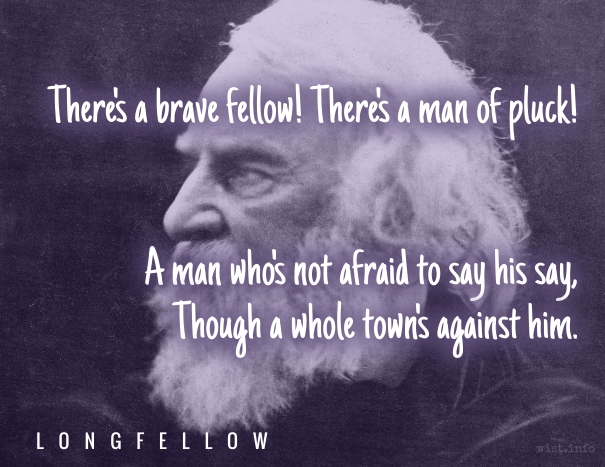To found the reward for virtuous actions on the approval of others is to choose too uncertain and shaky a foundation. Especially in an age as corrupt and ignorant as this, the good opinion of the people is a dishonor. Whom can you trust to see what is praiseworthy?
[De fonder la recompence des actions vertueuses, sur l’approbation d’autruy, c’est prendre un trop incertain et trouble fondement, signamment en un siecle corrompu et ignorant, comme cettuy cy la bonne estime du peuple est injurieuse. A qui vous fiez vous, de veoir ce qui est louable?]Michel de Montaigne (1533-1592) French essayist
Essays, Book 3, ch. 2 “Of Repentence [Du Repentir]” (1586) (3.2) (1595) [tr. Frame (1943)]
(Source)
This essay first appeared in the 1588 ed. The second sentence/phrase (on the age being so corrupt) and following were added for the 1595 ed.
(Source (French)). Alternate translations:
To ground the recompence of vertuous actions, upon the approbation of others, is to undertake a most uncertaine or troubled foundation, namely in an age so corrupt and times so ignorant, as this is: the vulgar peoples good opinion is injurious. Whom trust you in seeing what is commendable?
[tr. Florio (1603)]
To ground the Recompence of virtuous Actions upon the Approbation of others, is too uncertain and unsafe a Foundation; especially in so corrupt and ignorant an Age as this, the good Opinion of the Vulgar is injurious. Upon whom do you relie to shew you what is recommendable?
[tr. Cotton (1686)]
To ground the recompense of virtuous actions upon the approbation of others is too uncertain and unsafe a foundation, especially in so corrupt and ignorant an age as this, wherein the good opinion of the vulgar is injurious: upon whom do you rely to show you what is recommendable?
[tr. Cotton/Hazlitt (1877)]
To base the reward of virtuous actions on the approbation of others is to choose a too uncertain and obscure foundation. Especially in a corrupt and ignorant age like this, the good opinion of the vulgar is offensive; to whom do you trust to perceive what is praiseworthy?
[tr. Ives (1925)]
Basing the recompense of virtuous deeds on another’s approbation is to accept too uncertain and confused a foundation -- especially since in a corrupt and ignorant period like our own to be in good esteem with the masses is an insult: whom would you trust to recognize what was worthy of praise!
[tr. Screech (1987)]
Quotations about:
public opinion
Note not all quotations have been tagged, so Search may find additional quotes on this topic.
And yet there are some men here in this Senate who either genuinely fail to see, or make a pretense of not seeing, the disasters by which we are menaced. Their mildness has fostered Catiline’s hopes, and their refusal to believe in his growing conspiracy has given it strength. Had I punished Catiline, their influence would cause many persons, some of them malignant but others merely ignorant, to say that I had acted with tyrannical brutality.
[Quamquam non nulli sunt in hoc ordine qui aut ea quae imminent non videant aut ea quae vident dissimulent; qui spem Catilinae mollibus sententiis aluerunt coniurationemque nascentem non credendo conroboraverunt; quorum auctoritate multi non solum improbi verum etiam imperiti, si in hunc animadvertissem, crudeliter et regie factum esse dicerent.]
Marcus Tullius Cicero (106-43 BC) Roman orator, statesman, philosopher
Orationes in Catilinam [Catilinarian Orations], No. 1, § 12, cl. 30 (1.12.30) (63-11-08 BC) [tr. Grant (1960)]
(Source)
Urging the Senate banish Catiline before he and his followers overthrow the Roman Republic.
(Source (Latin)). Alternate translations:
Although there are some in this House, who either not see what is imminent, or dissemble what they see; who have cherish'd the hopes of Catiline with useless (?) Votes, and have confirmed the rising Conspiracy, by not believing it: whose Authority many, not onely out of malice, but of simplicity following, had I executed him, would have said, it had been a cruel and tyrannical Act
[tr. Wase (1671)]
Yet even now, in this very assembly, there are senators, and those not a few, who do not see the impending danger; or, seeing it, think proper to disguise their sentiments. By specious moderation they have pampered the hopes of Catiline, and, affecting to think my fears no more than a false alarm; they favoured the conspiracy in its birth; By their example numbers have been influenced; the evil-minded raised a spirit of discontent, and the weak joined in the clamour, All of that description would be ready to pronounce the death of Catiline the act of a violent and arbitrary Consul.
[tr. Sydney (1795)]
Though there are some men in this body who either do not see what threatens, or dissemble what they do see; who have fed the hope of Catiline by mild sentiments, and have strengthened the rising conspiracy by not believing it; influenced by whose authority many, and they not wicked, but only ignorant, if I punished him would say that I had acted cruelly and tyrannically.
[tr. Yonge (1856)]
Although there are in this assembly some who either may not see those things which are impending, or who may conceal their knowledge of those things which they see; who have nourished the hope of Catiline by mild opinions, and who have strengthened the growing conspiracy by not believing it; following whose authority many, not only the wicked, but also the unskillful, if I should have inflicted punishment on him, would say that this had been done cruelly and tyrannically.
[tr. Mongan (1879)]
Although there are some in this order (assembly), who either may see not those (things) which impend, or may dissemble those (things), which they see: who have nourished the hope of Catiline by soft (mild) opinions, and have strengthened the growing conspiracy by believing (it) not. The authority of whom many having followed, not only the dishonest, but also the unskillful, if I might have animadverted upon him (if I had punished him), would say (it) to have been done cruelly and royally (tyrannically).
[tr. Underwood (1885)]
Although there are some in this order [body], who either may not see these (things) which impend, or may dissemble those (things) which they see: who have nourished the hope of Catiline by soft [mild] opinions, and have strengthened the growing conspiracy by not believing (it). The authority of whom many have followed, not only the dishonest, but also the inexperienced, if I had given attention to [punished] him they, would say )it) to have [had] been done cruelly and royally [tyrannically].
[tr. Dewey (1916)]
And yet there are several men in this body, of the kind who either do not see what is threatening to them, or disguise what things they see, and these men nourish the hope of Catiline by tender notions and strengthen the young conspiracy by not believing; by whose authority many not only wicked (men), but also inexperienced (men), if I were to have (Catiline) punished , would say that it had been done cruelly and despotically.
[IB Notes]
But if you have a fear of unpopularity, is that arising from the imputation of vigour and boldness, or that arising from that of inactivity and indecision most to be feared? When Italy is laid waste by war, when cities are attacked and houses in flames, do you not think that you will be then consumed by a perfect conflagration of hatred?
[Sed si quis est invidiae metus, non1 est vehementius severitatis ac fortitudinis invidia quam inertiae ac nequitiae pertimescenda. An, cum bello vastabitur Italia, vexabuntur urbes, tecta ardebunt, tum te non existimas invidiae incendio conflagraturum]
Marcus Tullius Cicero (106-43 BC) Roman orator, statesman, philosopher
Orationes in Catilinam [Catilinarian Orations], No. 1, § 11, cl. 29 (1.11.29) (63-11-08 BC) [tr. Yonge (1856)]
(Source)
Speaking (aloud, rhetorically) to himself about his concerns of public reaction to his acting so passionately against Cataline's conspiracy.
(Source (Latin)). Alternate translations:
But if there be any fear of Envy, is the Censure of Severity and Courage more greatly to be feared, than that of Baseness and Cowardise? Do you not think, when Italy shall be made desolate with War, the Cities plundered, the Houses a-fire, you shall then fall under a flagrant Envy?
[tr. Wase (1671)]
If fear is to operate, which do you think is most to be dreaded, reproach for cowardice, or censure for magnanimity? When Italy is laid waste; when her cities are taken by storm; when her temples and mansions are wrapt in flames; it is then your danger will begin; it is then that the clamours of mankind will be loud against you.
[tr. Sydney (1795)]
But if there is any fear of odium, whether should the odium resulting from severity and determinati0on be dreaded more violently than that of indolence and wickedness? Whether, when Italy shall be ravaged by war, when the cities shall be harassed, when roofs shall be burning, dost thou not think that thou then will burn with a conflagration of odium?
[tr. Mongan (1879)]
But if there is any fear of envy (displeasure), whether is the envy of severity and of fortitude to be feared more violently, than (that) of inactivity and of negligence? Whether, when Italy shall be devastated with war, cities shall be burned, roofs (houses) shall be on fire: dost thou think thyself not (to be) about to burn then with a conflagration of envy (unpopularity)?
[tr. Underwood (1885)]
But if there is any fear of ill will, is the ill will because of strictness and courage to be feared more strongly, than (that) because of inactivity and negligence? When Italy shall be devastated with war, cities shall be harassed, roofs [houses] shall burn: do you think (you) yourself will not (about to) be consumed then with a conflagration of ill will?
[tr. Dewey (1916)]
If the question of inviting disapproval arises at all, the unpopularity resulting from firmness and determination is no more to be dreaded than the opprobrium produced by culpable failure to act. For when Italy is to be ravaged by war, when cities are assaulted and houses gutted by fire, do you not see how utterly the flames of hatred will consume you then?
[tr. Grant (1960)]
But if there is any fear of hatred, it is not hatred of harshness and firmness requiring to be feared more violently than (hatred) of idleness and worthlessness. Or when Italy is laid waste to, the cities will be harassed, the buildings will burn, then do you not think that you will be consumed by burning hatred?
[IB Notes]
Call me a scoundrel, only call me rich!
All ask how great my riches are, but none
Whether my soul is good.[ἔα με κερδαίνοντα κεκλῆσθαι κακόν]
Euripides (485?-406? BC) Greek tragic dramatist
Bellerophon [Βελλεροφῶν], frag. 181 (Nauck, TGF) (c. 430 BC) [tr. Gummere (1925)]
(Source)
Barnes frag. 65. Found (in Latin) in Seneca, Epistulae morales ad Lucilium, 115.14:
Sine me vocari pessimum, ut dives vocer.
An dives, omnes quaerimus, nemo, an bonus.
(Source (Greek)). Alternate translations:
If any gain ensue, I am content.
To be term'd wicked. We all ask this question,
Whether a man be rich, not whether virtuous.
[tr. Wodhull (1809)]
Let me be called a scoundrel, but a rich one.
We all ask if he’s rich, not if he’s good.
[Source]
When the whole world is running towards a cliff, he who is running in the opposite direction appears to have lost his mind.
If all the People of different Opinions in this Province would engage to give me as much for not printing things they don’t like, as I can get by printing them, I should probably live a very easy Life; and if all Printers were every where so dealt by, there would be very little printed.
Benjamin Franklin (1706-1790) American statesman, scientist, philosopher, aphorist
“Apology for Printers,” Philadelphia Gazette (1731-06-10)
(Source)
A statesman is a man that can do what the politician would like to do but can’t, because he is afraid of not being elected.
FIRST OFFICER: That’s a brave fellow, but he’s vengeance proud and loves not the common people.
SECOND OFFICER: ’Faith, there hath been many great men that have flattered the people who ne’er loved them; and there be many that they have loved they know not wherefore; so that, if they love they know not why, they hate upon no better a ground. Therefore, for Coriolanus neither to care whether they love or hate him manifests the true knowledge he has in their disposition and, out of his noble carelessness, lets them plainly see ’t.
William Shakespeare (1564-1616) English dramatist and poet
Coriolanus, Act 2, sc. 2, l. 5ff (2.2.5-15) (c. 1608)
(Source)
Businesses have changed when the public came to expect and require different behavior, to reward businesses for behavior that the public wanted, and to make things difficult for businesses practising behaviors that the public didn’t want. I predict that in the future, just as in the past, changes in public attitudes will be essential for changes in businesses’ environmental practices.
Jared Diamond (b. 1937) American geographer, historian, ornithologist, author
Collapse: How Societies Choose to Fail or Succeed, “Big businesses and the environment” (2005)
(Source)
What is blasphemy? I will give you a definition; I will give you my thought upon this subject. What is real blasphemy?
To live on the unpaid labor of other men — that is blasphemy.
To enslave your fellow-man, to put chains upon his body — that is blasphemy.
To enslave the minds of men, to put manacles upon the brain, padlocks upon the lips — that is blasphemy.
To deny what you believe to be true, to admit to be true what you believe to be a lie — that is blasphemy.
To strike the weak and unprotected, in order that you may gain the applause of the ignorant and superstitious mob — that is blasphemy.
To persecute the intelligent few, at the command of the ignorant many — that is blasphemy.
To forge chains, to build dungeons, for your honest fellow-men — that is blasphemy.
To pollute the souls of children with the dogma of eternal pain — that is blasphemy.
To violate your conscience — that is blasphemy.
The jury that gives an unjust verdict, and the judge who pronounces an unjust sentence, are blasphemers.
The man who bows to public opinion against his better judgment and against his honest conviction, is a blasphemer.
Robert Green Ingersoll (1833-1899) American lawyer, agnostic, orator
Speech to the Jury, Trial of C. B. Reynolds for Blasphemy, Morristown, New Jersey (May 1887)
(Source)
In this and like communities, public sentiment is everything. With public sentiment, nothing can fail; without it nothing can succeed. Consequently, he who molds public sentiment goes deeper than he who enacts statutes or pronounces decisions. He makes statues and decisions possible or impossible to be executed.
Abraham Lincoln (1809-1865) American lawyer, politician, US President (1861-65)
Lincoln-Douglas Debates, Debate #1, Ottawa, Illinois (21 Aug 1858)
(Source)
With exceptions so rare they are regarded as miracles of nature, successful democratic politicians are insecure and intimidated men. They advance politically only as they placate, appease, bribe, seduce, bamboozle, or otherwise manage to manipulate the demanding and threatening elements in their constituencies. The decisive consideration is not whether the proposition is good but whether it is popular — not whether it will work well and prove itself but whether the active talking constituents like it immediately. Politicians rationalize this servitude by saying that in a democracy public men are the servants of the people.
Walter Lippmann (1889-1974) American journalist and author
“The Democratic Malady,” The Public Philosophy (1955)
(Source)
He who would acquire fame must not show himself afraid of censure. The dread of censure is the death of genius.
William G. Simms (1806-1870) American writer and politician
Egeria, Or Voices of Thought and Counsel, for the Woods and Wayside, “Ambition” (1853)
(Source)
Sometimes I aint so sho who’s got ere a right to say when a man is crazy and when he aint. Sometimes I think it aint none of us pure crazy and aint none of us pure sane until the balance of us talks him that-a-way. It’s like it aint so much what a fellow does, but it’s the way the majority of folks is looking at him when he does it. … That’s how I reckon a man is crazy. That’s how he cant see eye to eye with other folks. And I reckon they aint nothin else to do with him but what the most folks says is right.
A strong man must be militant as well as moderate. He must be a realist as well as an idealist. If I am to merit the trust invested in me by some of my race, I must be both of these things. This is why nonviolence is a powerful as well as a just weapon. If you confront a man who has long been cruelly misusing you, and say, “Punish me, if you will; I do not deserve it, but I will accept it, so that the world will know I am right and you are wrong,” then you wield a powerful and a just weapon. This man, your oppressor, is automatically morally defeated, and if he has any conscience, he is ashamed. Wherever this weapon is used in a manner that stirs a community’s, or a nation’s, anguished conscience, then the pressure of public opinion becomes an ally in your just cause.
Martin Luther King, Jr. (1929-1968) American clergyman, civil rights leader, social activist, preacher
Playboy interview (Jan 1965)
(Source)
We boast our emancipation from many superstitions; but if we have broken any idols, it is through a transfer of idolatry. What have I gained, that I no longer immolate a bull to Jove or to Neptune, or a mouse to Hecate; that I do not tremble before the Eumenides, or the Catholic Purgatory, or the Calvinistic Judgment-day, — if I quake at opinion, the public opinion as we call it; or at the threat of assault, or contumely, or bad neighbors, or poverty, or mutilation, or at the rumor of revolution, or of murder? If I quake, what matters it what I quake at?
Ralph Waldo Emerson (1803-1882) American essayist, lecturer, poet
“Character,” Essays: Second Series (1844)
(Source)
What the tender poetic youth dreams, and prays, and paints to-day, but shuns the ridicule of saying aloud, shall presently be the resolutions of public bodies, then shall be carried as grievance and bill of rights through conflict and war, and then shall be triumphant law and establishment for a hundred years, until it gives place, in turn, to new prayers and pictures.
Ralph Waldo Emerson (1803-1882) American essayist, lecturer, poet
“Politics,” Essays: Second Series (1844)
(Source)
This quotation is more often given as the paraphrase used by another speaker of the era, the abolitionist Wendell Phillips:
What the tender and poetic youth dreams to-day, and conjures up with inarticulate speech, is to-morrow the vociferated result of public opinion, and the day after is the charter of nations.
Phillips used this phrase, prefixed with, "As Emerson says," and in quotation marks, at least twice. First in his lecture "Harper's Ferry" (1 Nov 1859), Brooklyn. Second, in a different context, in "The Scholar in a Republic" (30 Jun 1881), a famous speech at the centennial of the Phi Beta Kappa society at Harvard University.
Emerson did not use this shorter phrasing, however, in any of his written works, and frequent attributions of it to him are in error.
Do what you think is right and to hell with your popularity.
Brian Mulroney (b. 1939) Canadian politician, Prime Minister (1984-93)
Remark to US President Bill Clinton (2 Jun 1993)
(Source)
Quoted by Mulroney in a press conference.
How much trouble he avoids who does not look to see what his neighbor says or does or thinks, but only to what he does himself, that it may be just and pure.
[Ὅσην εὐσχολίαν κερδαίνει ὁ μὴ βλέπων τί ὁ πλησίον εἶπεν ἢ ἔπραξεν ἢ διενοήθη, ἀλλὰ μόνον τί αὐτὸς ποιεῖ, ἵνα αὐτὸ τοῦτο δίκαιον ᾖ καὶ ὅσιον ἢ † κατὰ τὸν ἀγαθὸν.]
Marcus Aurelius (AD 121-180) Roman emperor (161-180), Stoic philosopher
Meditations, Book 4, #18 [tr. Long (1862)]
(Source)
Original Greek. Alternate translations:
How much time and leisure doth he gain, who is not curious to know what his neighbour hath said, or hath done, or hath attempted, but only what he doth himself, that it may be just and holy?
[tr. Casaubon (1634), #15]
What a great deal of Time and Ease that Man gains who is not troubled with the Spirit of Curiosity: Who lets his Neighbor's Thoughts and Behavior alone, confines his Inspections to himself' And takes care of the Points of Honesty and Conscience.
[tr. Collier (1701)]
What a great deal of time and ease that man gains who lets his neighbor's words, thoughts, and behavior alone, confines his inspections to himself, and takes care that his own actions are honest and righteous.
[tr. Zimmern (1887)]
How much time he gains who does not look to see what his neighbor says or does or thinks, but only at what he does himself, to make it just and holy.
[tr. Morgan, in Bartlett's Familiar Quotations (1894)]
How much valuable time may be gained by not looking at what some neighbor says or does or thinks, but only taking care that our own acts are just and holy.
[tr. Rendall (1898 ed.)]
What richness of leisure does he gain who has no eye for his neighbour's words or deeds or thoughts, but only for his own doings, that they be just and righteous!
[tr. Haines (1916)]
How great a rest from labour he gains who does not look to what his neighbour says or does or thinks, but only to what he himself is doing, in order that exactly this may be just and holy, or in accord with a good man's conduct.
[tr. Farquharson (1944); he notes "The text is faulty and the sense obscure."]
What ease of mind a person gains when he keeps his eye not on what his neighbor has said or done or thought but only on what he himself does, to ensure that it is just or holy or matches what a good person does.
[tr. Gill (2014)]
There’s a brave fellow! There’s a man of pluck!
A man who’s not afraid to say his say,
Though a whole town’s against him.
The political leaders with whom we are familiar generally aspire to be superstars rather than heroes. The distinction is crucial. Superstars strive for approbation; heroes walk alone. Superstars crave consensus; heroes define themselves by the judgment of a future they see it as their task to bring about. Superstars seek success in a technique for eliciting support; heroes pursue success as the outgrowth of their inner values.
Please all, and you will please none.
There is one characteristic of the present direction of public opinion peculiarly calculated to make it intolerant of any marked demonstration of individuality. The general average of mankind are not only moderate in intellect, but also moderate in inclinations; they have no tastes or wishes strong enough to incline them to do anything unusual, and they consequently do not understand those who have, and class all such with the wild and intemperate whom they are accustomed to look down upon.
If forty million people say a foolish thing it does not become a wise one, but the wise man is foolish to give them the lie.
W. Somerset Maugham (1874-1965) English novelist and playwright [William Somerset Maugham]
A Writer’s Notebook (1949)
An entry dated 1901. More discussion about this quotation: If Fifty Million People Say a Foolish Thing, It Is Still a Foolish Thing – Quote Investigator
Public opinion polls are useful if a politician uses them only to learn approximately what the people are thinking, so that he can talk to them more intelligently. The politician who sways with the polls is not worth his pay. And I believe the people eventually catch up with the man who merely tells them what he thinks they want to hear.
It is said public opinion will not bear it. Really? Public opinion, I am sorry to say, will bear a great deal of nonsense. There is scarce any absurdity so gross, whether in religion, politics, science, or manners, which it will not bear.
War will exist until that distant day when the conscientious objector enjoys the same reputation and prestige that the warrior does today.
John F. Kennedy (1917-1963) US President (1961-63)
Letter to a Navy friend (1945)
(Source)
Letter to a past PT-boat crew mate, responding to a question about his experiences at the United Nations founding in San Francisco (Jun 1945). Quoted in Arthur Schlesinger, Jr., A Thousand Days: John F. Kennedy in the White House, ch. 4, sec. 4 (1965).
The basis of our governments being the opinion of the people, the very first object should be to keep that right; and were it left to me to decide whether we should have a government without newspapers, or newspapers without a government, I should not hesitate a moment to prefer the latter.
Thomas Jefferson (1743-1826) American political philosopher, polymath, statesman, US President (1801-09)
Letter to Edward Carrington (16 Jan 1787)
(Source)
Against our traditions we are now entering upon an unjust and trivial war, a war against a helpless people, and for a base object — robbery. At first our citizens spoke out against this thing, by an impulse natural to their training. Today they have turned, and their voice is the other way. What caused the change? Merely a politician’s trick — a high-sounding phrase, a blood-stirring phrase which turned their uncritical heads: Our Country, right or wrong! An empty phrase, a silly phrase. It was shouted by every newspaper, it was thundered from the pulpit, the Superintendent of Public Instruction placarded it in every schoolhouse in the land, the War Department inscribed it upon the flag. And every man who failed to shout it or who was silent, was proclaimed a traitor — none but those others were patriots. To be a patriot, one had to say, and keep on saying, “Our Country, right or wrong,” and urge on the little war. Have you not perceived that that phrase is an insult to the nation?
Each of you, for himself, by himself and on his own responsibility, must speak. And it is a solemn and weighty responsibility, and not lightly to be flung aside at the bullying of pulpit, press, government, or the empty catch-phrases of politicians. Each must for himself alone decide what is right and what is wrong, and which course is patriotic and which isn’t. You cannot shirk this and be a man. To decide against your convictions is to be an unqualified and inexcusable traitor, both to yourself and to your country, let men label you as they may. If you alone of all the nation shall decide one way, and that way be the right way according to your convictions of the right, you have done your duty by yourself and by your country — hold up your head! You have nothing to be ashamed of.
All the important human advances that we know of since historical times began have been due to individuals of whom the majority faced virulent public opposition.
Bertrand Russell (1872-1970) English mathematician and philosopher
Interview by Woodrow Wyatt, BBC TV (1959)
Collected in Bertrand Russell's BBC Interviews (1959) [UK] and Bertrand Russell Speaks His Mind (1960) [US]. Reprinted (abridged) in The Humanist (1982-11/12), and in Russell Society News, #37 (1983-02).
What is blasphemy? I will give you a definition; I will give you my thought upon this subject. What is real blasphemy?
To live on the unpaid labor of other men — that is blasphemy.
To enslave your fellow-man, to put chains upon his body — that is blasphemy.
To enslave the minds of men, to put manacles upon the brain, padlocks upon the lips — that is blasphemy.
To deny what you believe to be true, to admit to be true what you believe to be a lie — that is blasphemy.
To strike the weak and unprotected, in order that you may gain the applause of the ignorant and superstitious mob — that is blasphemy.
To persecute the intelligent few, at the command of the ignorant many — that is blasphemy.
To forge chains, to build dungeons, for your honest fellow-men — that is blasphemy.
To pollute the souls of children with the dogma of eternal pain — that is blasphemy.
To violate your conscience — that is blasphemy.
The jury that gives an unjust verdict, and the judge who pronounces an unjust sentence, are blasphemers.
The man who bows to public opinion against his better judgment and against his honest conviction, is a blasphemer.Robert Green Ingersoll (1833-1899) American lawyer, agnostic, orator
Trial of C.B. Reynolds for blasphemy (May 1887)
(Source)
Our credulity is greatest concerning the things we know least about. And since we know least about ourselves, we are ready to believe all that is said about us. Hence the mysterious power of both flattery and calumny.
Eric Hoffer (1902-1983) American writer, philosopher, longshoreman
The Passionate State of Mind, Aphorism 128 (1955)
(Source)
In this respect, the freedom of the press is certainly for the state machine what the safety-valve is for the steam-engine. For by means of it, every dissatisfaction is at once ventilated in words and such grievance is soon exhausted if in it there is not very much substance. If, however, there is, then such ventilation is a good thing and enables the matter to be known in time and to be put right. This is very much better than forcing down the grievance so that it simmers, ferments, expands, and finally ends in an explosion.
[In dieser Hinsicht ist allerdings für die Staatsmaschine die Preßfreiheit Das, was für die Dampfmaschine die Sicherheitsvalve: denn mittelst derselben macht jede Unzufriedenheit sich alsbald durch Worte Luft, ja wird sich, wenn sie nicht sehr viel Stoff. hat, an ihnen erschöpfen. Hat sie jedoch diesen, so ist es gut, daß man ihn bei Zeiten erkenne, um abzuhelfen sehr viel besser, als wenn die Unzufriedenheit eingezwängt bleibt, brütet, gährt, kocht und anwächst, bis sie endlich zur Explosion gelangt.]
Arthur Schopenhauer (1788-1860) German philosopher
Parerga and Paralipomena, Vol. 2, ch. 9 “On Jurisprudence and Politics [Zur Rechtslehre und Politik],” § 127 (1851) [tr. Payne (1974)]
(Source)
(Source (German)). Alternate translation:
Freedom of the press is to the machinery of the state what the safety-valve is to the steam engine: every discontent is by means of it immediately relieved in words -- indeed, unless this discontent is very considerable, it exhausts itself in this way. If, however, it is very considerable, it is as well to know of it in time, so as to redress it.
[tr. Hollingdale (1970)]
Yes, Gentlemen; if I am asked why we are free with servitude all around us, why our Habeas Corpus Act has not been suspended, why our press is still subject to no censor, why we still have the liberty of association, why our representative institutions still abide in all their strength, I answer, It is because in the year of revolutions we stood firmly by our government in its peril; and, if I am asked why we stood by our government in its peril, when men all around us were engaged in pulling governments down, I answer, It was because we knew that though our government was not a perfect government, it was a good government, that its faults admitted of peaceable and legal remedies, that it had never inflexibly opposed just demands, that we had obtained concessions of inestimable value, not by beating the drum, not by ringing the tocsin, not by tearing up the pavement, not by running to the gunsmiths’ shops to search for arms, but by the mere force of reason and public opinion.
Thomas Babington Macaulay (1800-1859) English writer and politician
Speech on re-election to Parliament, Edinburgh (2 Nov 1852)
(Source)
On the various revolutions and counter-revolutions in Europe in 1848.
If it has to choose who is to be crucified, the crowd will always save Barabbas.
[S’il faut choisir un crucifié, la foule sauve toujours Barabbas.]
Jean Cocteau (1889-1963) French writer, filmmaker, artist
“Le Coq et l’Arlequin” (1918), Le Rappel à l’ordre (1926)
(Source)
But a new danger appears in the excess of influence of the great man. His attractions warp us from our place. We have become underlings and intellectual suicides. Ah! yonder in the horizon is our help; — other great men, new qualities, counterweights and checks on each other. We cloy of the honey of each peculiar greatness. Every hero becomes a bore at last.
Ralph Waldo Emerson (1803-1882) American essayist, lecturer, poet
“Uses of Great Men,” Representative Men Lecture 1, Boston (1845-12-11)
(Source)
When a man assumes a public trust, he should consider himself as public property, and justly liable to the inspection and vigilance of public opinion; and the more sensibly he is made to feel his dependence, the less danger will there be of his abuse of power.
Thomas Jefferson (1743-1826) American political philosopher, polymath, statesman, US President (1801-09)
Conversation with Baron Humboldt (1807)
(Source)
In Seymour, A Winter in Washingtonm ch. 9 (1824), further identified in Raynor, Life of Jefferson (1832). As it is all anecdotal, the accuracy may be easily questioned, but its proximity to the events lends it a certain validity.









































